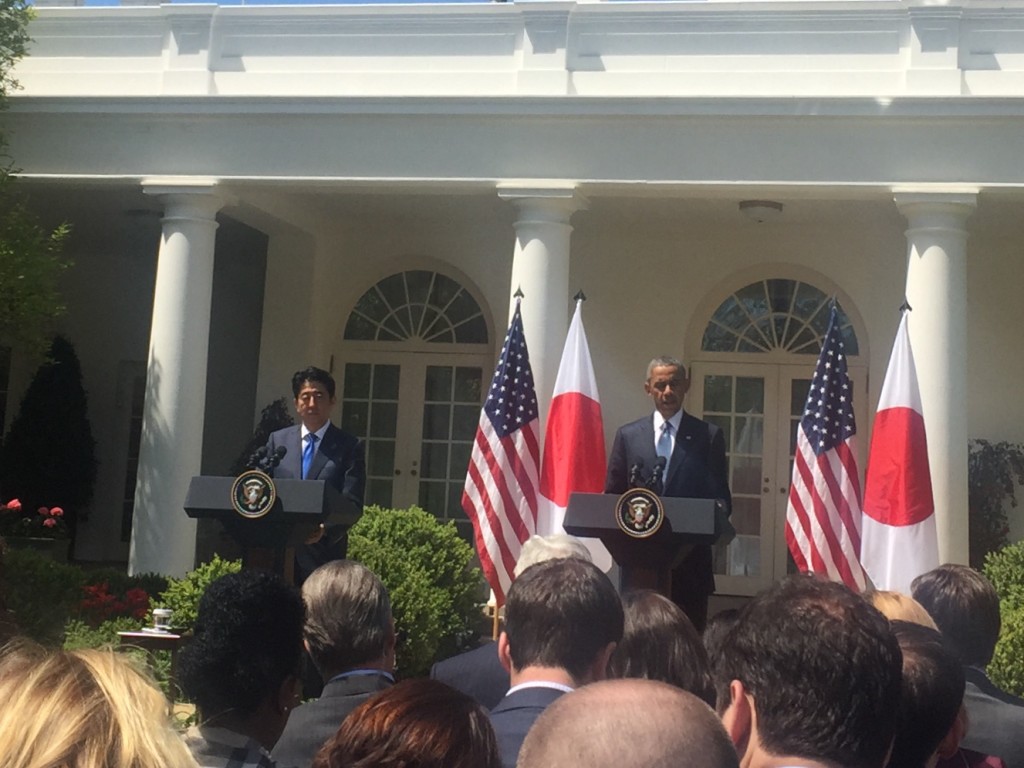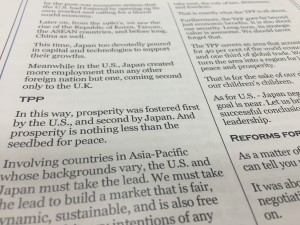
President Barack Obama and Japanese Prime Minister Shinzo Abe held a joint press conference at the White House on April 28. (Lei Xuan / Medill)
WASHINGTON – During Japanese Prime Minister Shinzo Abe’s recent state visit to Washington, both President Barack Obama and Abe highlighted the importance of the Trans-Pacific Partnership not only in terms of economic prosperity, but also the national security of both countries.
“The TPP goes far beyond just economic benefits,” said Abe during a speech to the U.S. Congress on Wednesday, April 29. “It is also about our security.”

“Let’s bring the TPP to a successful conclusion through our joint leadership,” said Japanese Prime Minister Shinzo Abe in his speech before U.S. Congress. (Lei Xuan / Medill)
However, after 20 rounds of negotiations since 2010, the key multinational trade agreement, commonly referred to as the TPP, still hasn’t been completed. The U.S. expects 11 other countries –including key trading partners Japan, Australia and Singapore – to adopt higher standards in areas like intellectual property and environmental protection.
Both Obama and Abe want to pass TPP as soon as possible. But the job has never been easy. Differences exist between those countries.
Most notably, the U.S. and Japan, the two largest economies in the TPP negotiations, can’t reach deals over agricultural issues and automobiles. Japanese farmers and automakers fear that their products will be less competitive in Japan’s domestic market than cheaper imports under the TPP framework.
In the U.S., lawmakers are reluctant to authorize the Trade Promotion Authority (TPA), a measure that will give Obama more authority over trade negotiations and accelerate multilateral TPP talks.
“In general, trade agreements are actually an exercise in foreign policy,” said Mireya Solis, a senor fellow at the Brookings Institution’s Center for East Asia Policy Studies.
Solis said TPP is an integral component of the United States’ “pivot to Asia” policy, in which the Obama administration seeks to devote more resources to the region. However, China sees the policy as a hedge against its increasing influence.
“It cannot just be a military redeployment,” Solis said. “The rebalance is more compelling and more attractive if you have some economic dimensions.”
In a recent speech about the next phase of the U.S. rebalance to the Asia-Pacific, Secretary of Defense Ashton Carter said, “passing TPP is as important to me as another aircraft carrier.”
“Trade in general is a big issue for national security,” said Andrea Montanino, director of the Atlantic Council, a Washington-based think tank that held an event on how trade strengthens U.S. national security and foreign policy last month.
The event, which featured Secretary of States John Kerry as a keynote speaker, concluded that America wants to reaffirm its leadership in the Asia-Pacific area by setting up future trade rules. “Why would you sit on the sideline, let other people do that?” asked Kerry.
Obama addressed the same issue in a recent interview with the Wall Street Journal. “If we don’t write the rules, China will write the rules out in that region,” he said. “We will be shut out, American businesses and American agriculture.”
Earlier this year, traditional U.S. allies including Australia, South Korea and European countries joined the China-proposed Asian Infrastructure Investment Bank in tandem, whereas Japan opted to stay away from the AIIB with the U.S.
Although the AIIB is still in its infancy, some critics have started questioning America’s leadership in Asia. “This past month (March 2015) may be remembered as the moment the United States lost its role as the underwriter of the global economic system,” wrote former Treasury Secretary Larry Summers on his website.
The U.S., with its staunch ally Japan, needs TPP to reaffirm its leadership in Asia, though the pressure may not directly come from the AIIB, because they are separate issues, Montanino said, adding that reaching a regional trade agreement would be much more powerful than setting up a bank.
“In a national security context, anytime the U.S. and Japan can’t agree, it casts doubts on the future of the bilateral security relationship,” said Edward Lincoln, an expert on Japan and an adjunct professor at the Department of Economics at Columbia University. “If we can’t reach an agreement, that will make us look very bad.”
Lincoln opined that Obama’s desire to create a positive legacy for his presidency and Abe’s need to claim success on Abenomics will drive both sides to an agreement on the bilateral part of the negotiations.
But Lincoln said Abe would be the one that particularly needs TPP. Besides Abe has to show his seriousness on joining TPP because he promised to do so, and because “he needs to be able to say the U.S. is a friend,” according to Lincoln.
“The circumstances that are surrounding TPP today is making itself like the last chance to change the status quo toward a positive way,” said a Japanese fellow with a U.S. think tank, speaking on the condition of anonymity. He said on the economic side, Japan needs to implement its structural reform, whereas on the geostrategic side, Japan and the U.S. are strengthening their alliance.
He said, however, both Japan and the U.S. are pursuing other free-trade agreements with other countries. For example, the U.S. is also in negotiations with European countries on a Transatlantic Trade and Investment Partnership, and Japan is discussing the framework of a Regional Comprehensive Economic Partnership with China and South Korea.
“I think it’s partly because the executive branches of both countries had to use this logic to persuade their domestic politics and the media to energize this debate. In that sense, I think TPP is a battle both Japan and the U.S. can’t afford to lose,” the anonymous Japanese expert said.





